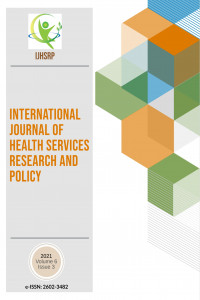Research Article
Aim & Scope
International Journal of Health Services Research and Policy (IJHSRP) serves all those directly involved in or concerned with, health services, health management, hospital administration, health policy and public health. The aim of this journal is to provide a peer-reviewed forum for health researchers and academics from all countries to share and discuss new issues and amendments in health-related problems. International Journal of Health Services Research and Policy welcomes applied researches, case studies, and reviews regarding the scope of the journal.
The scopes include:
Aging and Health
Audiology
Basic Medical Sciences
Child Development
Disability and Health
Environmental Health
Occupational Health
Genetics
Health Sciences
Health Tourism
Healthcare Financing
Healthcare Management and Organization
Healthcare Marketing
Informatics for Healthcare
Medical Sciences (Surgical and Internal)
Midwifery
Nursing
Nutrition &Dietetics
Physiotherapy and Rehabilitation
Speech and Language Therapy
Public Health
Sport Sciences
Author Guidelines
-The manuscript will be considered only on the understanding that it is not currently being submitted to other journals.
-Submission of an article implies that the results described has not been published previously (except in the form of an abstract or as part of a published lecture or academic thesis), that it is not under consideration for publication elsewhere, that its publication is approved by all authors and that, if accepted, it will not be published elsewhere in the same form, in English or in any other language, without the written consent of the Publisher.
-Authors are obliged to follow remarks and comments of the reviewers, as well as to follow Instructions for preparing manuscripts and technical remarks and corrections of the Editorial Board.
-The corresponding author should send the Author's Checklist, fulfilled and signed.
-Papers will be published in English, and authors are obliged to submit papers free of typing errors (please use Spell Checking).
-Editorial Board has the right to make small lector corrections and to shorten the text of the paper, which would not influence the author's ideas and presentation. After the computer layout of the paper, the authors will obtain text as a .pdf file for approval.
-The manuscripts, not exceeding 15 pages (for review papers maximum 20 pages), including figures and tables, excluding reference list, should be submitted in electronic form only in MS Word (.doc file) or LaTex format (.tex file).
-Please read all of the following manuscript preparation instructions carefully and in their entirety. The manuscript must be in good scientific English; this is the author's responsibility.
-All authors must have read and approved the most recent version of the manuscript.
-Manuscripts can only be submitted through the International Journal of Health Services Research and Policy
-Manuscripts submitted via any other medium will not be processed.
-Manuscripts submitted to the International Journal of Health Services, Research and Policy will first go through a technical evaluation process where the editorial office staff will ensure that the manuscript has been prepared and submitted in accordance with the journal’s guidelines.
-Submissions that do not conform to the journal’s guidelines will be returned to the submitting author with technical correction requests.
-The journal management requires that all authors register to ORCID at http://orcid.org/register and get a free ORCID ID.
-All submissions are screened by similarity detection software. We are using the iThenticate plagiarism solution and our maximum allowed score, for the document in which the Materials and Methods and References sections truncated, is 20%. Higher scores are not allowed and the author will be given the plagiarism report and the manuscript will be returned to the authors.
-You may download the Manuscript Template (Sample) here.
Ethics Committee approval number and date is required if the work involves chemicals, procedures, or equipment that have any unusual hazards inherent in their use, or if it involves the use of animal or human subjects. This information should be highlighted both in the Methods section and at the end of the article.
Conflict of interest:
The authors must notify any conflicts of interest.
Authors’ Contributions:
All authors mentioned in the paper must have significantly contributed to the research. The level of their contribution also must be defined at the end of the article.
References
Use IEEE style for references. For a summary of the IEEE references style, you can download the document from here.
References should be numbered in brackets in the order of appearance in the text, e.g. [1], [3, 4], [7-11], etc. The full references should be listed at the end of the paper (left alignment) in numerical order of citation in the text.
Data in references should be given in the following forms
-For Journals
Surname, N.N., Surname, N.N., “The full title of the article”, Journal Name, volume and issue, first and last page, year. DOI number.
Kentli, F., Yilmaz, M., “Mathematical modeling of two-axis photovoltaic system with improved efficiency”, Journal of Physical Chemistry, 4(2), 40-43, 2015. Doi:
– For Books
Gumz, W., Gas Producers and Blast Furnaces, John Wiley and Sons Inc., New York, 2008.
– For Chapters
Sinak, Y., Models and Projections of Energy Use in the Soviet Union, in International Energy Economics (Ed. T. Steiner), Chapman and Hall, London, pp. 1-53, 1998.
– For Proceedings (Transactions, Book of abstracts, Proceedings on CD, etc.)
Gabrielsson, J., “Extract-Air Window: a Key to Better Heat Economy in Buildings”, Proceeding of 10th World Energy Conference, Istanbul, Turkey, Vol. 1, 1997, pp. 21-28
– For Thesis
Rowe, V. M., Some Secondary Flow Problems in Fluid Dynamics, Ph. D. thesis, Cambridge University, Cambridge, UK, 1966
– For Reports
Tsuji, Y., Shen, N. Y., Numerical Simulation of Gas-Solid Flows: I – Particle-to-Wall Collision, Report No. 62, Osaka University, Osaka, Japan, 1989
– For literature or data on websites and documents without authors
International Engineering, Science and Education Group, http://www.inesegconferences.org
Ethical Principles and Publication Policy
International Journal of Health Services Research and Policy (IJHSRP) is committed to following the Code of Conduct and Best Practice Guidelines of COPE (Committee on Publication Ethics). It is the duty of our editors to follow Cope Guidance for Editors and our peer-reviewers must follow COPE with Ethical Guidelines for Peer Reviewers. (http://publicationethics.org/resources/code-conduct)
Please note that submitted manuscripts may be subject to checks using the iThenticate service, in conjunction with CrossCheck, in order to detect instances of overlapping and similar text.
The iThenticate software checks submissions against millions of published research papers, documents on the web, and other relevant sources. If plagiarism or misconduct is found, consequences are detailed in the policy.
We expect all authors to read and understand our ethics policy before submitting it to our journal. This is in accordance with our commitment to the prevention of ethical misconduct, which we recognize to be a growing problem in academic and professional publications. It is important to note that most incidents of plagiarism, redundant publication, copyright infringement or similar occur because of a lack of understanding, and not through fraudulent intent. Our policy is one of prevention and not persecution.
Authors’ Responsibilities
Authors should:
Ensure that all researched work submitted is original, fully referenced and that all authors are represented accurately. The submission must be exclusive and not under consideration elsewhere.
Provide accurate contact details for a designated corresponding author, who shall be deemed by the publisher and editor as fully responsible for the authorship of the paper and all communications concerning the ethical status and originality of the paper. This includes any queries or investigations that may arise, pre-or post-publication.
Expect to formally agree with publication terms that define the author and the publisher's rights for the work. Visit our website for further information and fulfill the Copyright Declaration Form.
Expect the editor to scan submissions using plagiarism detection software at iThenticate to check a paper's originality before sending out for review.
The articles should include a statement about the compliance of Research and Publication Ethics.
Hazards and human or animal subjects: Ethics Committee approval number and date is required if the work involves chemicals, procedures, or equipment that have any unusual hazards inherent in their use, or if it involves the use of animal or human subjects. This information should be highlighted both in the Methods section and at the end of the article.
If the study requires the use of human and animal subjects, it should be declared that the study was carried out in accordance with the international declaration, guidance, etc. (Such as the Helsinki Declaration).
iThenticate Plagiarism Resources: http://www.ithenticate.com/resources/6-consequences-of-plagiarism
Fully correspond and comply with the editor and publisher in any requests for source data, proof of authorship, or originality in a timely manner, providing a reasonable explanation for discrepancies or failures to disclose vital information.
Fully co-operate with any consequent investigations if the editor and/or publisher are dissatisfied with the evidence available or the explanations provided.
Expect transparency, efficiency, and respect from the publisher and the editor during the submissions process.
Remain in good communication with both the publisher and the editor.
Co-operate fully with the publication of errata and with the retraction of articles found to be unethical, misleading, or damaging.
Remain in good communication with the editor(s), the publisher, and any co-authors.
Editors’ Responsibilities
Editors should:
Read and understand COPE guidelines as well as IJHSRP's ethics policy, and follow them during all editorial processes. https://publicationethics.org/resources/guidelines-new/short-guide-ethical-editing-new-editors
Protect the reputation of their journal(s) and published work by only publishing content of the highest quality and relevance in a timely and responsible manner.
Carry out the thorough, objective, and confidential peer review for original article submissions that pass the initial quality check and editorial assessment, in adherence with COPE guidelines and IJHSRP's ethics policy.
The detail and justify any article types which will not be peer-reviewed (e.g. editorials, opinion pieces, etc.).
Provide a transparent review and publication process as far as is possible, with full respect and care paid to the author(s).
Provide advice and give reasonable explanations and updates to authors during the submissions process and once a decision has been made.
Allow authors the right to appeal any editorial decision.
Only accept papers based on the original merit, quality, and relevance of their content.
Support authors in queries concerning the originality of their submissions and request the support of IJHSRP if necessary.
Remain in good communication with both the publisher and the author(s).
Reviewers’ Responsibilities
Reviewers should:
Adhere to IJHSRP’s policy of confidential peer review of their journals. This includes, but is not restricted to, keeping their identity hidden from authors and not externally distributing any work that is passed to them for their eyes only.
Only accept invitations to review work that is relevant to their own expertise and specialty.
Review submitted work in a responsible, impartial, and timely manner.
Report any suspected ethical misconduct as part of a thorough and honest review of the work.
Avoid the use of unnecessarily inflammatory or offensive language in their appraisal of the work.
Accept the commitment to review future versions of the work and provide 'follow up’ advice to the editor(s), if requested.
Seek advice from the editor if anything is unclear at the time of invitation.
Remain in good communication with both the publisher and the editor.
IJHSRP’s Responsibilities
IJHSRP will:
Protect the reputation of our journal and published work by only publishing content of the highest quality and relevance in a timely and responsible manner.
Provide detailed information concerning both our understanding of publication ethics and our implementation of the same. Emphasize a desire for prevention, not eventual detection, of ethical misconduct.
Uphold our COPE membership (or of such similar organizations) and keep our editorial offices, publishing staff, and society partners up-to-date with their guidelines and policies, adapting our own where appropriate (and publicizing any update).
When necessary, request proof of originality/accuracy from the corresponding author of any work submitted to any of our journals.
Use plagiarism detection software when necessary for any submission to any journal at any stage of the submissions and publication process.
Provide a transparent submission and publication process, with full respect and care paid to the author. This includes detailed and dedicated instructions to authors for each journal, outlining referencing style, accepted article types, and submission processes.
Investigate thoroughly any suggestion of ethical misconduct detected during any stage of the submissions process. This can include but is not restricted to, the following: plagiarism, redundant publication, fabrication or misuse of data, and authorial disputes.
When necessary, retract articles that we deem to be unethical, misleading, or damaging.
When necessary, publish errata, corrigenda, and retractions in a timely and responsible fashion, detailing the decision online in an open access format and publishing in print as soon as possible.
Remain in good communication with editors, authors, reviewers, and society partners (where applicable).
Further reading
Authorship of the Paper: Authorship should be limited to those who have made a significant contribution to the conception, design, execution, or interpretation of the reported study.
Originality and plagiarism: The authors should ensure that they have written entirely original works, and if the authors have used the work and/or words of others that this has been appropriately cited or quoted.
Data access and retention: Authors may be asked to provide the raw data in connection with a paper for editorial review, and should be prepared to provide public access to such data.
Multiple, redundant, or concurrent publication: An author should not, in general, publish manuscripts describing essentially the same research in more than one journal or primary publication. IJHSRP does not view the following uses of a work as prior publication: publication in the form of an abstract; publication as an academic thesis; publication as an electronic preprint.
Disclosure and conflicts of interest: All submissions must include disclosure of all relationships that could be viewed as presenting a potential conflict of interest. The authors must notify the Editors of any conflicts of interest.
Authors’ Contributions:
All Authors mentioned in the paper must have significantly contributed to the research. The level of their contribution also must be defined at the end of the article.
Fundamental errors in published works: When an author discovers a significant error or inaccuracy in his/her own published work, it is the author’s obligation to promptly notify the journal editor or publisher and cooperate with the editor to retract or correct the paper.
Price Policy
Processing and publication are free of charge with the journal. There is no article processing charges or submission fees for any submitted or accepted articles.
Indexes
Citation Indexes
Other Indexes
Journal Boards
Editor-in-Chief

Co Editor-in-Chief

Editorial Board

Dr. Ahmad Ali is currently working as Associate Professor in the Department of Life Sciences, University of Mumbai, Mumbai, India. Earlier he worked in the National Institute of Pharmaceutical Education and Research (NIPER). He studied at Jamia Hamdard, New Delhi and University of Mumbai obtaining his M. Sc. and Ph. D. degree in Biochemistry and Life Sciences respectively. He has over 18 years of teaching and research experience. Presently he is heading the Molecular Biochemistry Laboratory in the Department where he is supervising MSc and PhD students. His areas of research are Protein and DNA Biochemistry with special contributions on Glycation of biomolecules, DNA damage, therapeutic potential of natural products in metabolic disorders. He has also made significant contributions in the area of artificial sweeteners and their role in the process of glycation. Cyanobacterial systems are another thrust area in his lab where researchers are exploring various applications of these organisms in the field of bioremediation, cosmetics and health benefits. He has received several extramural grants from Government and private funding agencies. He has collaborators from National and International laboratories. He is also a recipient of EMBO Travel Grant to attend European Molecular Biology Organization (EMBO) Research Course and CSIR Travel grant to attend International conference. He is serving as the Reviewer and member of Editorial board of various international journals like Chemosphere, Frontiers in Plant Sciences and Microbiology, Glycobiology, International Journal of Biological Macromolecules, and other journals of Elsevier, Frontiers, Springer etc. He has contributed more than 100 research articles in peer-reviewed national and international journals. He is also author of one book and more than 40 book chapters from Springer, Taylor & Francis and Elsevier publishing houses. He has presented his work in many international and national conferences as Invited Speakers and Resource persons. He has also worked as a Member of the organizing committee for many of these conferences. He was invited by the University of Debrecen, Hungary as Visiting Faculty and University of Agricultural Sciences and Veterinary Medicine, Cluj-Napoca, Romania on a Erasmus Mobility Program in 2024. Recently he also visited King Saud University to strengthen the ongoing collaborative projects and mentoring students for their Research projects.





I'm a medical teacher in the family medicine residency program at Universitas Indonesia in Jakarta. I've been working for 27 years working and my current position is Senior Lecturer. My professional work is as a family physician. I also actively join the professional association, the Indonesian Association of Family Physician and globally in WONCA.

Zeljko Vlaisavljevic was born in 1982, in Belgrade, Serbia.
BSc-Nurse since 2007, RN, BS HCM( Bachelor of Science in Healthcare Management) since 2008 , PhD - of Medical Sciences since 2016.Professor at the Department of Nurses Faculty of Pharmacy Novi Sad 2018.-2019. Profesor at the Department of Nurses College of Professional Medika, Belgrade 2019.it is ongoing.
Clinic for Gastroenterology and Hepatology Clinical Center of Serbia since 2007.
Head departments - semi-intensive care transplantation hepatology Clinical Center of Serbia since 2012.
1. Charter "life saver" IV Congress UINARS, Nis September 2014.
2. Prize for the best poster presentation prepared in the Congress UINARS 2010 Association of Nurses intensive care, anesthesia and resuscitation Serbia March, 2010.
3. Gratitude in recognition of outstanding contribution to the development of health promotion profession, nurses and professional association activities. Alliance of health professionals Republic of Serbia, Association of Nurses and Midwives technicians Serbia.maj 2007.

Prof. Dr. Ramazan Erdem received his bachelor's degree in 1994, his master's degree in 1997, and his doctorate in 2003 in Health Management from Hacettepe University (Türkiye). In 2009, he became an Associate Professor in Management and Organization, and in 2014, he was promoted to Professor. Since 2009, he has been a faculty member and head of the Department of Health Management in the Faculty of Economics and Administrative Sciences at Süleyman Demirel University. Prof. Erdem is a member of the Health Administrators Association, the European Union Health Research Center (ABSAM), the International Strategic Health Research Center (USSAM), and the Medical Decision Science Association of Taiwan (MEDSAT). Additionally, he has served on the Board of the Institute for Turkish Health Policy Studies since 2017. His main research interests include critical management and medical studies, health sociology, and the impact of global warming and climate change on healthcare. He holds leadership roles in several academic initiatives, including founding the Workshop of Critical Perspectives in Management (2017) and the Workshop of Health Sociology (2020). Currently, he directs the Thematic Research Group on Global Warming, Climate Change, and Healthcare Services, focusing on sustainable healthcare solutions in response to environmental challenges.
Neşet Hikmet is Professor of Health Information Technology in the College of Engineering and Computing, University of South Carolina where he also serves as the Director of Applied Sciences at Center for Applied Innovation and Advanced Analytics. His research expertise includes cloud computing, augmented analytics, health informatics, and healthcare internet of things. As an applied scientist he is heavily involved in design, development, deployment, and maintenance of large-scale computing systems. Dr. Hikmet has significant experience in leading health data analytics projects within academia, including utilization of a wide range of analytics methods and approaches. His research and projects have been funded by the National Science Foundation, National Institutes of Health, and other Federal and State agencies and Private Foundations.























